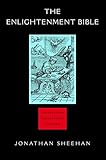The Enlightenment Bible : Translation, Scholarship, Culture / Jonathan Sheehan.
Material type: TextPublisher: Princeton, NJ : Princeton University Press, [2013]Copyright date: ©2005Edition: Course BookDescription: 1 online resource (296 p.) : 13 line illusContent type:
TextPublisher: Princeton, NJ : Princeton University Press, [2013]Copyright date: ©2005Edition: Course BookDescription: 1 online resource (296 p.) : 13 line illusContent type: - 9780691130699
- 9781400847792
- RELIGION / Christianity / History
- A Tale of a Tub
- Allan Bloom
- Anthony Collins
- Apocrypha
- Apologetics
- Athanasius Kircher
- August Hermann Francke
- Bible
- Biblical authority
- Biblical canon
- Biblical criticism
- Biblical inerrancy
- Biblical paraphrase
- Book of Job
- Catechism
- Christian Thomasius
- Christianity and Judaism
- Christianity
- Church Fathers
- Clement of Alexandria
- Criticism
- David Strauss
- Deism
- Dictionnaire Historique et Critique
- Dogma
- Dogmatic theology
- Donatism
- Edward Stillingfleet
- Epistle to the Hebrews
- Erudition
- Exegesis
- Francis Atterbury
- Franz Rosenzweig
- Friedrich August Wolf
- Friedrich Nicolai
- Friedrich Schleiermacher
- Geneva Bible
- God
- Hebrews
- Heresy
- Heterodoxy
- Infidel
- Jews
- Johann David Michaelis
- Johann Georg Hamann
- Johann Gerhard
- Johann Jakob Griesbach
- John Foxe
- John Toland
- Judaism
- Justification (theology)
- Karl Barth
- Karl Friedrich Bahrdt
- Karl Lachmann
- Literature
- Loci Theologici
- Luther Bible
- Lutheranism
- Masoretic Text
- Matthew Tindal
- Mennonite
- Methodism
- New Testament
- Nonconformist
- Old Christian
- Old Testament
- On Religion
- Participle
- Philology
- Pierre Bayle
- Pietism
- Poetry
- Protestant Reformers
- Protestantism
- Psalm 1
- Psalms
- Puritans
- Radical Pietism
- Reform Judaism
- Religion
- Religious text
- Richard Popkin
- Robert Estienne
- Romanticism
- Rosicrucianism
- Scholasticism
- Secularism
- Secularization
- Sirach
- Sola fide
- Spirituality
- Stephen Greenblatt
- Sturm und Drang
- The Kingdom of God Is Within You
- The Philosopher
- Theology
- Thomas Chubb
- Wilhelm Dilthey
- William Tyndale
- William Whiston
- online - DeGruyter
| Item type | Current library | Call number | URL | Status | Notes | Barcode | |
|---|---|---|---|---|---|---|---|
 eBook
eBook
|
Biblioteca "Angelicum" Pont. Univ. S.Tommaso d'Aquino Nuvola online | online - DeGruyter (Browse shelf(Opens below)) | Online access | Not for loan (Accesso limitato) | Accesso per gli utenti autorizzati / Access for authorized users | (dgr)9781400847792 |
Browsing Biblioteca "Angelicum" Pont. Univ. S.Tommaso d'Aquino shelves, Shelving location: Nuvola online Close shelf browser (Hides shelf browser)

|

|

|

|

|

|

|
||
| online - DeGruyter Making Peace with the 60s / | online - DeGruyter The Albanian National Awakening / | online - DeGruyter Frankenstein's Children : Electricity, Exhibition, and Experiment in Early-Nineteenth-Century London / | online - DeGruyter The Enlightenment Bible : Translation, Scholarship, Culture / | online - DeGruyter Uncorked : The Science of Champagne - Revised Edition / | online - DeGruyter The Crooked Timber of Humanity : Chapters in the History of Ideas - Second Edition / | online - DeGruyter Technology and Society under Lenin and Stalin : Origins of the Soviet Technical Intelligentsia, 1917-1941 / |
Frontmatter -- CONTENTS -- Preface: Forging the Cultural Bible -- Abbreviations -- Chapter One. The Vernacular Bible: Reformation and Baroque -- Part I: The Birth of the Enlightenment Bible -- Introduction -- Chapter Two. Scholarship, the New Testament, and the English Defense of the Bible -- Chapter Three. Religion, the New Testament, and the German Reinvention of the Bible -- Part II: The Forms of the Enlightenment Bible -- Introduction -- Chapter Four. Philology: The Bible from Text to Document -- Chapter Five. Pedagogy: The Politics and Morals of the Enlightenment Bible -- Chapter Six. Poetry: National Literature, History, and the Hebrew Bible -- Chapter Seven. History: The Archival and Alien Old Testament -- Part III: The Cultural Bible -- Introduction -- Chapter Eight. Culture, Religion, and the Bible in Germany, 1790–1830 -- Chapter Nine. “Regeneration from Germany”: Culture and the Bible in England, 1780–1870 -- Afterword -- Index
restricted access online access with authorization star
http://purl.org/coar/access_right/c_16ec
How did the Bible survive the Enlightenment? In this book, Jonathan Sheehan shows how Protestant translators and scholars in the eighteenth century transformed the Bible from a book justified by theology to one justified by culture. In doing so, the Bible was made into the cornerstone of Western heritage and invested with meaning, authority, and significance even for a secular age. The Enlightenment Bible offers a new history of the Bible in the century of its greatest crisis and, in turn, a new vision of this century and its effects on religion. Although the Enlightenment has long symbolized the corrosive effects of modernity on religion, Sheehan shows how the Bible survived, and even thrived in this cradle of ostensible secularization. Indeed, in eighteenth-century Protestant Europe, biblical scholarship and translation became more vigorous and culturally significant than at any time since the Reformation. From across the theological spectrum, European scholars--especially German and English--exerted tremendous energies to rejuvenate the Bible, reinterpret its meaning, and reinvest it with new authority. Poets, pedagogues, philosophers, literary critics, philologists, and historians together built a post-theological Bible, a monument for a new religious era. These literati forged the Bible into a cultural text, transforming the theological core of the Judeo-Christian tradition. In the end, the Enlightenment gave the Bible the power to endure the corrosive effects of modernity, not as a theological text but as the foundation of Western culture.
Mode of access: Internet via World Wide Web.
In English.
Description based on online resource; title from PDF title page (publisher's Web site, viewed 27. Jan 2023)


